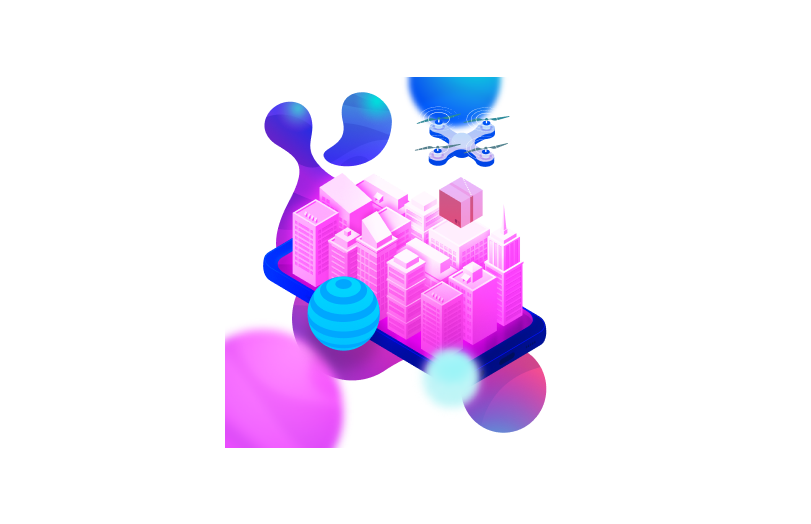Web development is one of the most in-demand and top-paid jobs in today’s world. From creating an interactive website to executing high-performing web-based applications, everything involves web developers. If you desire to be a web developer, then you are sure to make good money. However, do you comprehend the difference between a Full Stack vs. Front End vs. Back End Developer? We will break it down for you. We will thoroughly cover the types of web developers and help you understand the differences between them.
What is Web Development?
Web development, in simple words, is the procedure of creating a website for the Internet or an Intranet. It brings up the non-designing features of a website, like creating functionalities using scripting, programming, and markup languages. Here, the developers focus on the architecture application integration, and graphics.
Web development is further divided into three categories: Front-end development, Back-end development, and Full-stack development. Full-Stack development indeed is the combination of front-end development and back-end development.
What is Frontend Development?
Frontend Development refers to the development of front-end elements of a website. The production of features and functionalities that are immediately noticeable and accessible by the clients or the end-users are the aspects of front-end development. Besides, the front-end developer is the controller of most of the parts of the website.
They perform all sorts of stylings, text alignments, and navigations and significantly improve the user experience. In addition, the front-end developers also handle the responsiveness and performance while maintaining the website’s aesthetic.
Who Are the Frontend Developers?
Front-end developers contribute to the style and user interface of the website. Cascading Style Sheet (CSS) acts as the skeleton’s body, while HTML acts as a web page’s skeleton. Thus, CSS allows web developers to make specific changes to the predetermined sections and make the website of a particular type.
For instance, if the website is a building, then using CSS can change the color of the building or the placement of the windows. Front-end developers incorporate all these styles look into CSS files, and include them on the top of the HTML file. Then, whenever a user needs a particular kind, they refer to the CSS file that consists of the style.
What Skills Does Frontend Developer Need?
A front-end developer must have a good knowledge of scripting languages like HTML, JavaScript, and CSS3. If you aspire to be a successful front-end developer, then you must excel in these languages. The most important of these three is JavaScript. Besides, if you want to stand out and become the best, you should also master UI, UX, and jQuery.
What is a Backend Developer?
Back-end development refers to the web development process that occurs at the back of the programs. It includes activities like creating libraries, writing APIs, and working with system components. In addition, back-end developers create codes that facilitate the communication between the database and an application. Besides, they are in charge of the back end of the website.

Who Are the Back-end Developers?
The user interface of a website certainly needs to be appealing. However, the software that runs in the background plays a vital role. Without the background software, the user interface cannot work at all. Therefore, back-end developers work on the server side.
What Skills Does Frontend Developer Need?
Back-end developers must master PHP, Ruby, Python, and .Net to develop applications. Besides, they should also have a good knowledge of Oracle, Microsoft SQL, and MySQL. But, according to the developer’s community, the most important language is PHP.
PHP is a scripting language that works alongside the Structured Query Language (SQL). On the other hand, SQL is a database that retrieves data and enters it into an HTML file for display.
Who Are the Full-Stack Developers?
A full-stack web developer is a person who develops both the client and server software. In addition, they are the engineers who manage all the activities of databases and servers. They are proficient in both the front-end and back-end languages and can work in several frameworks.
What Skills Does Frontend Developer Need?
Full-stack developers are pertinent in all layers of the web development process. They are involved in planning projects, controlling databases, creating the user interface, and resolving mission-critical problems. Thus, full-stack developers must understand all levels of a website and the working principle of the web.
In conclusion, web development offers a diverse landscape of roles, each playing a crucial part in bringing digital experiences to life. Whether you aspire to specialize in Frontend, Backend, or embrace the versatility of a Full-Stack developer, mastering the essential languages and skills is key to success. As the backbone of the digital world, web developers shape the functionality and aesthetics of websites, making it an exciting and dynamic field to explore and thrive in. If you want to learn more about Full Stack vs. Front End vs. Back End Developer, be sure to check out our other blogs.




[…] technologies, developers can create powerful and secure digital solutions beyond what traditional web development can offer! But why do they go hand in hand and what are some popular uses of these technologies […]
[…] Check out an article on Full Stack Developer vs. Front End Developer vs. Back End Developer. […]
[…] Check out an article on Full Stack Developer vs. Front End Developer vs. Back End Developer. […]
[…] Check out an article on Full Stack Developer vs. Front End Developer vs. Back End Developer. […]
Comments are closed.